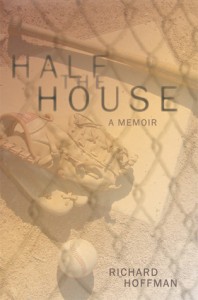
Richard Hoffman’s memoir, “Half the House”
Excerpt from “Backtalk: Notes Toward an Essay on Memoir,” by Richard Hoffman. Read this thought-provoking essay in its entirety here.
“The act of remembering one’s life and examining it for meaning is the elemental act of anyone on a spiritual quest. The subsequent shaping of that understanding into a work of art or literature is an act of faith in the possibility of communal meaning, the essential work of the artist, no matter what post-modern, atomized, mandarin critics claim. Memory was, is, and shall be mother of all the muses.
It may be that, in our moment, the impulse to write memoir, the marriage of the personal essay with dramatic narrative, stems largely from the overload experienced by writers driven back by the torrent of propaganda that attempts to shape a consensus through the media. These writers can only trust the frail first-person narrator sifting through real, not fictive, experience, in order to establish the existence of a reality beyond the one described so loudly and incessantly not by human beings, but by talking money. Their telling, their honesty and willingness to stand by their words, is the untelling of those pervasive lies that a culture of simulation and propaganda uses to numb and subdue us and trap us into the politically de-fanged and spiritually neutered ‘virtual reality’ of Plato’s video cave.
In other words, the ascendance of memoir may be a kind of backtalk, a cultural corrective to the sheer amount of fictional distortion that has accumulated in a society whose historians include Michael Eisner and Andrew Lloyd Webber. At the end of ‘the American Century,’ what’s been called ‘the memoir explosion’ may be our own ‘truth and reconciliation hearings,’ life by life and book by book. It’s no wonder that this makes some uncomfortable; there can be no account without an accounting, and the desire for a blanket amnesty requires an amnesia that can be soul-destroying. We tend to most want amnesty when we are exhausted and the hope of justice, of setting things right again, is lost. It is because the memoirist refuses this comfortable despair that the genre can be seen as having political meaning….”
♦ ♦ ♦
RICHARD HOFFMAN is author of the poetry collections Without Paradise, Gold Star Road, winner of the 2006 Barrow Street Press Poetry Prize and the New England Poetry Club’s Sheila Motton Book Award, and Emblem, as well as the short story collection Interference & Other Stories, and the celebrated memoir Half the House. He teaches at Emerson College, and currently serves as Chair of PEN New England.